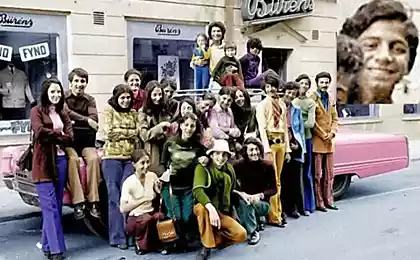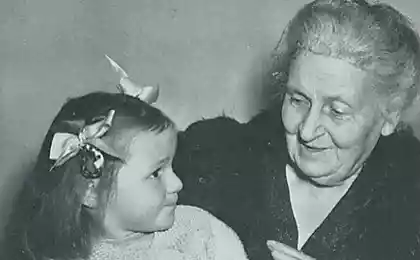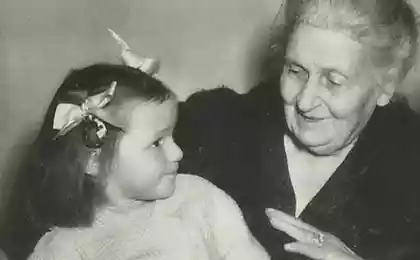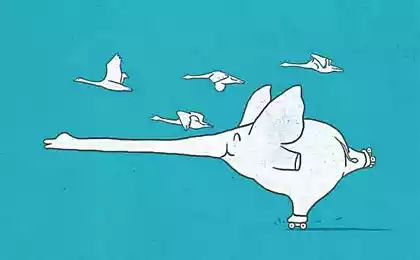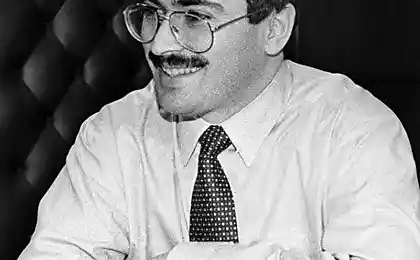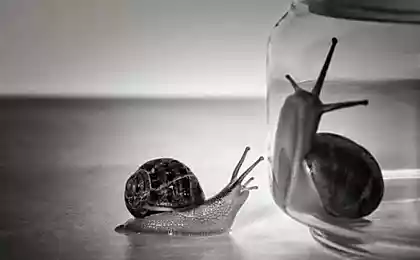690
Tal Ben-Shahar: I was wrong about the formula of happiness
In her almost 45 years Ben-Shahar is one of the most prominent and influential scientists in the field of positive psychology, founder of the research Institute of well being (Wholebeing Institute) and possibly the same man who knows how to build her life so she was happy.
What prompted you to make the happiness of your scientific specialty? Maybe an unhappy childhood?
Tal Ben-Shahar: I can't call my childhood unhappy. Rather, I lived with a constant feeling of distress, I feel all the time something was missing. I was born in Israel and has dedicated himself to his passion, the game of squash. Then it seemed to me that happiness I will gain a day when going to win the national championship. At 16 I became the youngest champion of Israel, and, of course, I was very happy! A couple of hours. And then came back all the same feelings of emptiness. Then I decided that it would be gone forever if I would become a world champion. I trained hard, and in 20 years went to study in the United States. And from the side it looked great: I went to Harvard, studied computer science, was an excellent student; world champion, however, did not, but won several Championships in the USA. But happy was not. And it caused me once to go to the rector and to inform you that I want to change the curriculum and to engage seriously with philosophy and psychology. "Why?" – she wondered. "Because I was plagued by two questions,' I said. First: why am I not happy with what is going on in my life? And second: how can I still be happier?"
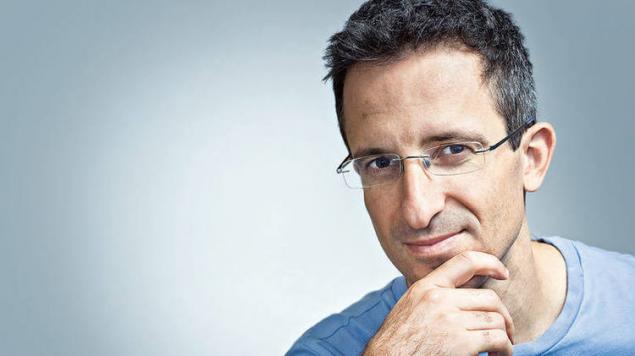
Maybe with these questions, it was appropriate to go to a therapist? T. B.-S.: Perhaps, but then I don't come to mind. Yes, I did not feel depressed, on the contrary, I had very strong motivation. Later I realized that I was suffering from what the existential psychologist Viktor Frankl called "the existential void". I was determined, but was desperately bored.
Did the study of psychology and philosophy to find answers to your question? T. B.-S.: For starters, it helped find a lot of new questions! But then came some answers. The first was the realization that all my childhood and youth I believed in wrong, although the most common formula for happiness. It read: good luck plus success equals happiness. Ask any parent what they would like for their children, and almost all will surely answer you: "To be happy". But most parents push children in ways that are not very suitable and sometimes not suitable. Because most often assume that the key to happiness is professional success.
This discovery helped you to become happier? T. B.-S.: Yes, because I was finally able to afford to do not the fact that certainly leads to success, and that makes sense to me. I was attracted to philosophy and literature, but in school it was my weaknesses, and I tried not to think about them. For many years I followed the path that was bad for me, in obedience to a wrong formula for happiness.
The feeling of emptiness was due to this? T. B.-S.: Yes, but not only. It was still in my addiction from the side view. For example, we all want happiness: this is also considered to be one of the foundations of happiness. But also social, all welcome "I", each of us is also the inner self. And it in some point may not require a prosperous relationship. I'm a very long time was concerned only with his social "I" and paid little attention to the inner life.
We helped you "back to yourself" to hear the voice of this inner "I"? T. B.-S.: Well, for example, one exercise that I often suggest to students in my classes. Imagine that you are bewitched, made it so that anybody and never learns about what you do and what you will reach. In this case, what will you do? The me this exercise often encouraged to make very radical choices. Although not always. For example, when I asked this question during the preparation of the doctoral thesis, the answer was obvious: "If I was so enchanted, I wouldn't try to get this doctorate". However, I knew that this degree required me to become a teacher. So I continued, but now realizing the meaning of their efforts. As you can see, hear the internal "I" does not necessarily mean all radically change and turn upside down. Sometimes it is more important to understand why and what we do in life.
Many people worry about this: they don't know what they are doing and want to do in life... T. B.-S.: of Course, much depends on the strength of the desire to achieve something. It is not at all the same. But we all, except for very very rare cases, there is a desire to live, to learn, to move forward. And the question is how we cultivate this desire or tend to suppress it. I don't want my words sounded banal "spells", type: "anyone can become anyone they want enough to want it". I know that it is much more difficult. But I also know that a simple search of these germs of desire in itself makes us stronger, at least slightly closer to goal, pushing forward. Conversely, if we think that we have no desires and no goals, it acts as a destructive self-fulfilling prophecy.
In the new book you argue that we are responsible to create your happiness – or not to do it. Do you think a depressed person such a conclusion will make stronger or, on the contrary, will break completely?
T. B.-S.: If one who has depression, turned to me with this question, I would advise him not to read my book and go see the therapist. But the therapist would probably use this book from time to time, working with the elections that are particularly difficult are given to the client. In General, choose your life is never easy. But it is important to realize that it is possible in principle.
In the study of happiness you are inspired by philosophy. And as far as positive psychology has enriched your understanding of happiness? T. B.-S.: Oh, I can't say very much! Aristotle believed that the two main ingredients of eudaimonia, the overall experience of happiness, friendship and contemplation. Positive psychology just proved it experimentally. Confucius talked about how important it is to cultivate inner happiness, before turning to the others, and it is now also proved. So the role of positive psychology is most likely that she, through research, helps determine which of the philosophers not agree with each other turned out to be largely right. His experiential approach to positive psychology continues the philosophical debate. But it does not make them the final point!
A, positive psychology, not only effective but also very simple: make fail, to Express what I feel... And yet we don't apply them in everyday life. Perhaps psychologists should be more engaged in our mechanisms of resistance?
T. B.-S.: This is a question that I take very how to maintain a will to change? Socrates, for example, believed that it is very simple: "to Know the good means to do good." But, unfortunately, I was wrong, which is also proven empirically: simple knowledge that is good for us, is not enough. Offers an alternative to religion. I'm not a religious person, but I think the theologians have perfectly understood what keeps us the will to change: repetition and reminders. Repetition is daily prayer, attending the temple. And reminders – chants, icons, symbols. But it is possible and outside of religion. Look at the bracelet on my wrist. I wear it only every other month, to remind yourself about one of the aspects of life over which should work. Now it's on me, because I want to be more easy and simple: I'm too serious and is prone to philosophizing!.. However, there is one subtlety. Any research, including in positive psychology, do not give universal results. For example, positive psychology has discovered the importance of expressing gratitude. This is largely due to the books of the psychologist Sonia Lubomirski (Sonja Lyubomirsky). But she admits that doesn't practice this method, because for her it – imagine! – does not work. Any experiments tell us not about us individually, but only the average values. And all we can do is to try to check for yourself if it works for us in one method or another.
Can I say that without becoming a world champion in the game of squash, you ultimately become the world champion of happiness? T. B.-S. (Laughs.): No, to me the championship is still far! And then, at the forefront I put today is not happiness, but acceptance of your own humanity, that my failures and my shortcomings. So I still have a goal to succeed and improve. But the important thing is that this desire comes from me, not from the side.
Accepting their own failures and shortcomings, we risk to develop acceptance, and guilt... T. B.-S.: to avoid it, you need to cultivate humility. That will be the topic of my next book. And I do it for the same reason that when started to write something about happiness. Then I wanted to be happier. And now I want to become more humble.
What is the future of positive psychology? T. B.-S.: I very much hope that it will soon simply cease to exist, becoming a full part of psychology at all. In addition, I believe that we need to broaden their ideas about happiness. Largely for this I organized a research center, the Institute of wellbeing (1). There are considered five components of happiness: spiritual, physical, intellectual, emotional and one that is associated with the relationship. Because the goal of each of us – not just to experience positive emotions, but also to grow intellectually and mentally. And to share your happiness with people and to make sense of his own life.
SIX "RECIPES" OF HAPPINESS 1. Allow yourself to be human. Accept your fears, sadness and anxiety as part of myself. Then you will soon be able to overcome them. Denial of your emotions is the path to misfortune.
2. Happiness is born in the Union of pleasure and meaning. Try at least a few times a week to pulse, providing you with both.
3. State of mind is more important than status or the amount in the account. With rare exception our well-being depends on how we interpret events and what focusareas.
4. Do not overload yourself! The desire to fit more things in less time ultimately hurts us. The number of passes in quality, significantly reducing it.
5. Body and mind are connected. All that does – or does not! – our body affects the state of mind. Healthy eating, enough sleep and regular exercise enhance mental health.
6. Often Express gratitude. We are too apt to take his life for granted instead appreciate her joy – good people to the delicious food, the beauty of nature to the smiles on the face of a stranger. T. B.-S. published
Author Yuri Teeth
P. S. And remember, just changing your mind — together we change the world! ©
Join us in Facebook , Vkontakte, Odnoklassniki
Source: www.psychologies.ru/people/razgovor-s-ekspertom/tal-ben-shahar-ya-oshibalsya-naschet-formulyi-schastya/
What prompted you to make the happiness of your scientific specialty? Maybe an unhappy childhood?
Tal Ben-Shahar: I can't call my childhood unhappy. Rather, I lived with a constant feeling of distress, I feel all the time something was missing. I was born in Israel and has dedicated himself to his passion, the game of squash. Then it seemed to me that happiness I will gain a day when going to win the national championship. At 16 I became the youngest champion of Israel, and, of course, I was very happy! A couple of hours. And then came back all the same feelings of emptiness. Then I decided that it would be gone forever if I would become a world champion. I trained hard, and in 20 years went to study in the United States. And from the side it looked great: I went to Harvard, studied computer science, was an excellent student; world champion, however, did not, but won several Championships in the USA. But happy was not. And it caused me once to go to the rector and to inform you that I want to change the curriculum and to engage seriously with philosophy and psychology. "Why?" – she wondered. "Because I was plagued by two questions,' I said. First: why am I not happy with what is going on in my life? And second: how can I still be happier?"

Maybe with these questions, it was appropriate to go to a therapist? T. B.-S.: Perhaps, but then I don't come to mind. Yes, I did not feel depressed, on the contrary, I had very strong motivation. Later I realized that I was suffering from what the existential psychologist Viktor Frankl called "the existential void". I was determined, but was desperately bored.
Did the study of psychology and philosophy to find answers to your question? T. B.-S.: For starters, it helped find a lot of new questions! But then came some answers. The first was the realization that all my childhood and youth I believed in wrong, although the most common formula for happiness. It read: good luck plus success equals happiness. Ask any parent what they would like for their children, and almost all will surely answer you: "To be happy". But most parents push children in ways that are not very suitable and sometimes not suitable. Because most often assume that the key to happiness is professional success.
This discovery helped you to become happier? T. B.-S.: Yes, because I was finally able to afford to do not the fact that certainly leads to success, and that makes sense to me. I was attracted to philosophy and literature, but in school it was my weaknesses, and I tried not to think about them. For many years I followed the path that was bad for me, in obedience to a wrong formula for happiness.
The feeling of emptiness was due to this? T. B.-S.: Yes, but not only. It was still in my addiction from the side view. For example, we all want happiness: this is also considered to be one of the foundations of happiness. But also social, all welcome "I", each of us is also the inner self. And it in some point may not require a prosperous relationship. I'm a very long time was concerned only with his social "I" and paid little attention to the inner life.
We helped you "back to yourself" to hear the voice of this inner "I"? T. B.-S.: Well, for example, one exercise that I often suggest to students in my classes. Imagine that you are bewitched, made it so that anybody and never learns about what you do and what you will reach. In this case, what will you do? The me this exercise often encouraged to make very radical choices. Although not always. For example, when I asked this question during the preparation of the doctoral thesis, the answer was obvious: "If I was so enchanted, I wouldn't try to get this doctorate". However, I knew that this degree required me to become a teacher. So I continued, but now realizing the meaning of their efforts. As you can see, hear the internal "I" does not necessarily mean all radically change and turn upside down. Sometimes it is more important to understand why and what we do in life.
Many people worry about this: they don't know what they are doing and want to do in life... T. B.-S.: of Course, much depends on the strength of the desire to achieve something. It is not at all the same. But we all, except for very very rare cases, there is a desire to live, to learn, to move forward. And the question is how we cultivate this desire or tend to suppress it. I don't want my words sounded banal "spells", type: "anyone can become anyone they want enough to want it". I know that it is much more difficult. But I also know that a simple search of these germs of desire in itself makes us stronger, at least slightly closer to goal, pushing forward. Conversely, if we think that we have no desires and no goals, it acts as a destructive self-fulfilling prophecy.
In the new book you argue that we are responsible to create your happiness – or not to do it. Do you think a depressed person such a conclusion will make stronger or, on the contrary, will break completely?
T. B.-S.: If one who has depression, turned to me with this question, I would advise him not to read my book and go see the therapist. But the therapist would probably use this book from time to time, working with the elections that are particularly difficult are given to the client. In General, choose your life is never easy. But it is important to realize that it is possible in principle.
In the study of happiness you are inspired by philosophy. And as far as positive psychology has enriched your understanding of happiness? T. B.-S.: Oh, I can't say very much! Aristotle believed that the two main ingredients of eudaimonia, the overall experience of happiness, friendship and contemplation. Positive psychology just proved it experimentally. Confucius talked about how important it is to cultivate inner happiness, before turning to the others, and it is now also proved. So the role of positive psychology is most likely that she, through research, helps determine which of the philosophers not agree with each other turned out to be largely right. His experiential approach to positive psychology continues the philosophical debate. But it does not make them the final point!
A, positive psychology, not only effective but also very simple: make fail, to Express what I feel... And yet we don't apply them in everyday life. Perhaps psychologists should be more engaged in our mechanisms of resistance?
T. B.-S.: This is a question that I take very how to maintain a will to change? Socrates, for example, believed that it is very simple: "to Know the good means to do good." But, unfortunately, I was wrong, which is also proven empirically: simple knowledge that is good for us, is not enough. Offers an alternative to religion. I'm not a religious person, but I think the theologians have perfectly understood what keeps us the will to change: repetition and reminders. Repetition is daily prayer, attending the temple. And reminders – chants, icons, symbols. But it is possible and outside of religion. Look at the bracelet on my wrist. I wear it only every other month, to remind yourself about one of the aspects of life over which should work. Now it's on me, because I want to be more easy and simple: I'm too serious and is prone to philosophizing!.. However, there is one subtlety. Any research, including in positive psychology, do not give universal results. For example, positive psychology has discovered the importance of expressing gratitude. This is largely due to the books of the psychologist Sonia Lubomirski (Sonja Lyubomirsky). But she admits that doesn't practice this method, because for her it – imagine! – does not work. Any experiments tell us not about us individually, but only the average values. And all we can do is to try to check for yourself if it works for us in one method or another.
Can I say that without becoming a world champion in the game of squash, you ultimately become the world champion of happiness? T. B.-S. (Laughs.): No, to me the championship is still far! And then, at the forefront I put today is not happiness, but acceptance of your own humanity, that my failures and my shortcomings. So I still have a goal to succeed and improve. But the important thing is that this desire comes from me, not from the side.
Accepting their own failures and shortcomings, we risk to develop acceptance, and guilt... T. B.-S.: to avoid it, you need to cultivate humility. That will be the topic of my next book. And I do it for the same reason that when started to write something about happiness. Then I wanted to be happier. And now I want to become more humble.
What is the future of positive psychology? T. B.-S.: I very much hope that it will soon simply cease to exist, becoming a full part of psychology at all. In addition, I believe that we need to broaden their ideas about happiness. Largely for this I organized a research center, the Institute of wellbeing (1). There are considered five components of happiness: spiritual, physical, intellectual, emotional and one that is associated with the relationship. Because the goal of each of us – not just to experience positive emotions, but also to grow intellectually and mentally. And to share your happiness with people and to make sense of his own life.
SIX "RECIPES" OF HAPPINESS 1. Allow yourself to be human. Accept your fears, sadness and anxiety as part of myself. Then you will soon be able to overcome them. Denial of your emotions is the path to misfortune.
2. Happiness is born in the Union of pleasure and meaning. Try at least a few times a week to pulse, providing you with both.
3. State of mind is more important than status or the amount in the account. With rare exception our well-being depends on how we interpret events and what focusareas.
4. Do not overload yourself! The desire to fit more things in less time ultimately hurts us. The number of passes in quality, significantly reducing it.
5. Body and mind are connected. All that does – or does not! – our body affects the state of mind. Healthy eating, enough sleep and regular exercise enhance mental health.
6. Often Express gratitude. We are too apt to take his life for granted instead appreciate her joy – good people to the delicious food, the beauty of nature to the smiles on the face of a stranger. T. B.-S. published
Author Yuri Teeth
P. S. And remember, just changing your mind — together we change the world! ©
Join us in Facebook , Vkontakte, Odnoklassniki
Source: www.psychologies.ru/people/razgovor-s-ekspertom/tal-ben-shahar-ya-oshibalsya-naschet-formulyi-schastya/
UN: losses of natural catastrophes for 20 years, has reached $6 trillion
How to grow a kumquat tree on the windowsill





